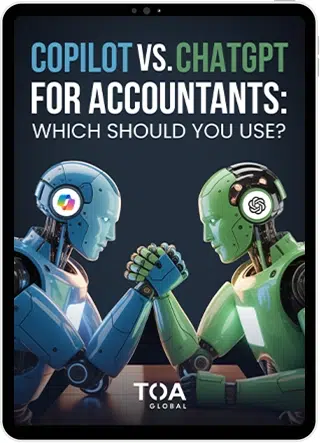Tired of losing talent? You’re not alone.
Losing employees doesn’t only take a financial toll on firm owners—it also hurts to see your team members, especially the best ones, leave one by one.
So, what are the problems with retention? Here are the reasons we found:
What Really Kills Employee Retention in Accounting
Yes, Boomer retirements are rising. Yes, Gen Z switches jobs more often. And yes, accounting often gets labeled as dull or outdated. But these are surface-level trends—common across many industries.
The real issues run deeper.
We’ve analyzed the data to uncover the key factors behind low retention in accounting—and how to fix them with targeted, actionable strategies.
Here’s what you need to know.
Mistake #1: No Work-Life Balance

Ask an accountant when’s the last time they truly unplugged, and you’ll likely get a laugh. Long hours, tight deadlines, and constant pressure make real breaks rare—wellness pauses, hobbies, and social time often fall by the wayside.
To make things worse, many firms still neglect to invest in tools that could ease the workload and improve efficiency.
It’s no surprise younger accountants are asking: What’s the point of earning money if I never have time and energy to enjoy it? This mindset drives a growing number to seek out lighter, more flexible careers—accelerating the talent shortage across the industry.
How Can Accountants Achieve Work-Life Balance?

For accountants, work-life balance isn’t just a nice-to-have—it’s essential. Long hours and constant deadlines demand mental clarity and resilience, and that’s only possible with enough rest, recovery, and time away from spreadsheets.
To make balance realistic (and not mythical), we recommend implementing policies that respect time, energy, and well-being:
- Strict clock-out times to protect personal hours
- Fair overtime compensation if overtime is necessary
- lexible work arrangements for better control over schedules
- Support for healthy routines, including sleep, exercise, and proper nutrition
- Encouragement to socialize and recharge outside work
When work ends, it should actually end. We encourage accounting firms/firm owners to promote self-care to their employees—whether that’s catching up on sleep, strength training, dancing, or even something as simple as a walk in the park.
The bottom line is the more balanced their lives are, the better their performance gets!
Mistake #2: Limited Growth Opportunities

While some accountants are content in stable, routine roles, many want more. They don’t want to stagnate and plateau—they want valuable, meaningful work that they enjoy.
Accountants are natural problem-solvers and critical thinkers. They want to contribute to strategy, planning, and decision-making. They’re eager to grow, sharpen higher-level skills, and make a real impact.
But in many firms, those opportunities simply aren’t there.
When talented professionals feel stuck, underutilized, or undervalued, morale drops—and so does retention. Eventually, they leave in search of roles where their potential is recognized and their skills can be fully developed.
What’s a Good Accounting Career Plan?

The truth is that every accountant has the potential to lead. Their sharp analytical and critical thinking skills form a solid foundation, but that potential needs the right support to grow.
That’s why continuous training and development aren’t just optional but essential.
Accountants should actively pursue professional growth through certifications like the CPA or CMA and by attending workshops, industry programs, and upskilling sessions focused on emerging technologies like AI and automation software.
Participating in these opportunities offers more than just technical knowledge. It also unlocks:
- Valuable networking connections
- Mentorship from experienced professionals
- Growth of leadership skills
- Exposure to fresh perspectives
- A culture of collaboration and innovation
As accountants move forward in their careers, these experiences help them stay relevant, adaptable, and prepared for change. This makes them more valuable to their teams and organizations alike.
In short, when accountants grow, everyone benefits.
Mistake #3: Lack of Recognition and Poor Benefits

When hard work goes unrecognized, even the most dedicated professionals start to feel invisible. Morale dips, small wins are overlooked, and praise is too often directed elsewhere.
This lack of appreciation isn’t just in a few isolated cases: They also bleed into systems, evident in limited health benefits, poor retirement plans, and minimal paid time off (PTO), among others. These issues are still common in many workplaces, especially in industries prone to exploitation.
However, employees today are pushing back against outdated systems. They’re no longer satisfied with surface-level perks that don’t solve real problems. They seek meaningful benefits that support their well-being, both in the present and the long term.
For many accountants, this general lack of appreciation and recognition of their value chips away at their motivation. Passion turns into frustration. Commitment fades into indifference. Over time, the job they once loved becomes just another source of burnout.
And when nothing changes, they eventually walk away.
Ways to Show You Value Your Staff

Well-planned employee benefits can make a world of difference for accountants, especially when you consider the long hours and high-pressure scenarios they often face.
With perks like health benefits, employee recognition programs, and even mental health initiatives, accountants can enjoy a healthier work life, which ultimately boosts productivity and job satisfaction. To improve employee retention, here are some things you should consider building solid and sound company policies on:
- Competitive compensation
- Employee's annual salary increase
- Health benefits
- Sick/vacation leaves and paid time off (PTO)
- Stress management initiatives
- Wellness programs
Benefits don’t only reduce employee turnover but also increase employee satisfaction. When your employees’ needs are met, employees stay happy, fulfilled, and ready to take on any challenge at work!
Mistake #4: Unrealistic Goals and Moving Targets

Imagine reaching for something you’ve worked hard for—a new car, a new home, or a business—only for it to be pulled just out of reach every time you get close.
That’s what it feels like when goals are set unrealistically high. No matter how much effort you put in, the finish line keeps moving. It creates a sense of frustration and unfairness, as if success is deliberately withheld.
Over time, this leads to stress, discouragement, and a loss of trust in leadership. When expectations are consistently unreachable, employees start to believe that their efforts don’t matter and that real rewards are out of reach no matter how hard they try.
Research shows that excessive barriers to achieving recognition or rewards directly impact employee retention. It’s more than a morale issue—it’s a flight risk.
Free Downloadable Guide: Retaining and Growing Talent
How to Make Rewards Attainable

It’s all about setting realistic goals that motivate without overwhelming.
Start by aligning rewards with specific, measurable outcomes like timely completion of audits or innovative cost-saving initiatives—think bonuses or extra days off when targets are met.
When it comes to the requirements before your employees can enjoy their rewards, it’s good to reduce them. Say, from five conditions to just three.
You may also involve the team in discussions about what they value. Give them surveys or informal chats to uncover their preferences for rewards, whether that’s professional development opportunities or a cozy team outing.
From there, you can snag some wins along the way: Celebrate quick milestones to keep their spirits high and reinforce their progress as well.
Remember that consistency is crucial; therefore, regularly review your reward policies and adjust them as needed. This is your key to a stable workforce that feels recognized, appreciated, and valued.
Mistake #5: Lack of Guidance

Even the world’s greatest explorers—Marco Polo, Columbus—didn’t rely solely on instincts. They had maps, tools, and guides to navigate unfamiliar terrain. Without support, their journeys wouldn’t have changed history.
The same applies to accountants. Whether it’s a first-day junior auditor or a seasoned professional tackling a new system, navigating the complex world of accounting without guidance can be overwhelming.
Lack of access to essential tools, being expected to cover training costs out-of-pocket, or working under absent, unresponsive leaders—especially during high-pressure periods like tax season—creates confusion, stress, and frustration.
Unfortunately, some firms check all these boxes and then wonder why turnover is high.
Our advice? Don’t be that firm.
How Important are Guidance and Mentorship in Accounting?

Mentorship programs are like a GPS for navigating through the fog of financial regulations and even career pitfalls.
With seasoned mentors who are present and involved, young accountants can exchange “do NOT try this at home” tales for tried-and-true strategies. These programs aren’t just for dodging rookie blunders; they also arm newcomers with insider knowledge on climbing the corporate ladder without stepping on too many toes (or balance sheets).
In short, mentorship transforms accounting newbies into confident number ninjas ready to tackle anything from audits to annual reports—all while keeping their sanity intact.
Mistake #6: Job Mismatch

A poor job fit is often described as a “square peg in a round hole”—and it can quietly undermine your business.
In high-pressure situations, some firms resort to speed hiring without properly assessing role alignment. But bringing in the wrong people just to fill seats often backfires.
Mismatched hires reduce team cohesion, lower job satisfaction, and drive up turnover—turning short-term fixes into long-term setbacks.
Beyond retention, job mismatches also impact employee morale, loyalty, and overall performance. It’s a risk no firm can afford to overlook.
How Do You Avoid Job Mismatches?

A strong job match not only reduces employee turnover but also drives productivity! When skills and passions align with roles, it fosters employee loyalty and fulfillment, making even the most attractive offers from other firms easy to decline.
So, think long-term when it comes to hiring. Don’t fall into the trap of rush hiring, which is likely to give you costly implications. Good things take time, after all!
Mistake #7: Exclusively Hiring In-house Teams

Relying solely on in-house teams in today’s economy is no longer sustainable, especially in industries like accounting, where skills shortages are a persistent challenge.
The downsides are clear: limited scalability, high training and turnover costs, and slower adaptation to market demands.
Today, companies are restructuring, rethinking their business models, and embracing hybrid teams that combine onshore expertise with global talent.
If you want to stay competitive, consider moving beyond the in-house-only mindset and explore the benefits of a flexible, global workforce.
Why Should You Consider Offshoring?

Managing hiring, training, and retention can be costly. In this case, offshoring is your power move! It cuts expenses, brings fresh talent to the table, and builds teams that can weather local turnover. On top of that, it opens doors for global talent to shine—and earn more while doing it. What’s not to love?
How Offshoring Boosts Employee Retention

We get it—offshoring can raise concerns about sidelining local employees. But the truth is that the right onshore-offshore balance does the opposite!
When you delegate lower-level tasks offshore, your domestic team gains time for higher-value work, boosting engagement and retention. It’s not just a cost-saving move—it’s a strategy for growth, career development, and long-term talent loyalty.
With offshoring, you don’t need any other complicated retention strategies because it is the strategy!
Here are the ways it solves all the pain points we’ve mentioned:
- No work-life balance? Offshore companies take the bulk of your routinary tasks, allow you to focus on your business strategies, and let you breathe freely!
- Worried about growth? Offshore teams grow as your firm grows! No matter the scale of your business, offshore teams are here to align with your needs and goals!
- Need more recognition and appreciation? Offshore companies know that employees, be they in-house or not, need nurturing to flourish. They have well-crafted and comprehensive recognition programs and appreciation initiatives!
- Trouble with guidance and mentorship? Offshore teams and their onshore leaders utilize digital tools to share knowledge across time zones with virtual workshops and hands-on back-and-forth feedback!
- Poor reward policies? Offshore companies have robust reward policies that not only attract top talent but also foster motivation and employee loyalty!
- Job mismatch issues? Offshore teams are flexible and versatile, regardless of task, job scope, or season. You'll always find a match with offshore employees.
Boost Employee Retention with TOA Global
Imagine a partner who understands your challenges and delivers effortlessly. That’s TOA Global.
Let our elite global teams handle the routine work so your onshore talent can focus on high-impact strategy. No hiring headaches, engagement issues, or culture clashes—just a seamless way to retain top talent and scale with confidence!
























